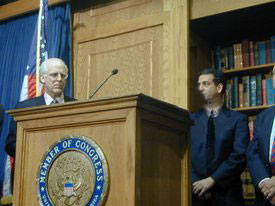
The Lowell Sun reports that staff members of Representative Marty Meehan (Democrat, Massachusetts) have been found editing the representatives Wikipedia entry. As has been noted in a number of places (see, for example, this Slashdot discussion), Meehan’s staff edited out references to his campaign promise to leave the House after eight years, among other things, and considerably brightened the picture of Meehan painted by his biography there.
Meehan’s staff editing the Wikipedia doesn’t appear to be illegal, as far as I can tell, even if they’re trying to distort his record. It does thrust some issues about how Wikipedia works into the spotlight – much as Beppe Grillo did in Italy last week. Sunlight disinfects; this has brought up the problem of political vandalism stemming from Washington, and Wikipedia has taken the step of banning the editing of Wikipedia by all IP address from Congress while they try to figure out what to do about it: see the discussion here.
This is the sort of problem that was bound to come up with Wikipedia: it will be interesting to see how they attempt to surmount it. In a broad sense, trying to forcibly stop political vandalism is as much of a political statement as anything anyone in the Capitol could write. Something in me recoils from the idea of the Wikipedia banning people from editing it, even if they are politicians. The most useful contribution of the Wikipedia isn’t their networked search for a neutral portrait of truth, for this will always be flawed; it’s the idea that the truth is inherently in flux. Just as we should approach the mass media with an incredulous eye, we should approach Wikipedia with an incredulous eye. With Wikipedia, however, we know that we need to – and this is an advance.

Just as we should approach the mass media with an incredulous eye, we should approach Wikipedia with an incredulous eye. With Wikipedia, however, we know that we need to – and this is an advance.
This is it exactly! Wikipedia is the encyclopedia that’s true to life. This, in turn, suggests a totally new way of reading.
You know, when you look at that statement by itself, it seems similar in form to the argument made by Bill Thompson at the BBC: that Google censoring the Chinese is less evil because it tells the Chinese that they’re being censored. I don’t buy that argument there – it seems an apology for a company that’s doing less than it could (and less than it said it would). Is Wikipedia a different case entirely? I need to think about this.
The saga gets better (or worse.) The telegraph
reports that in the UK, staff of the House of Parliment have been going into MP’s entries and removing critical information and padding them favorable commentary.